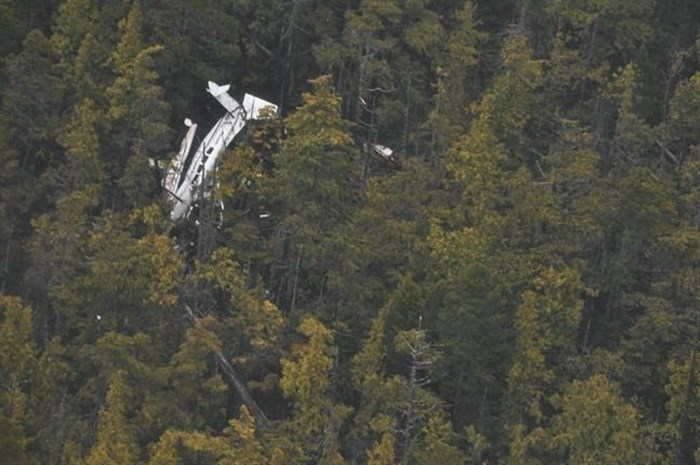
A plane's fuselage is seen through the canopy of forest at a crash site on Addenbroke Island, B.C., in a July 26, 2019, aerial handout photo. The Transportation Safety Board of Canada says a decision to continue flying in poor weather led to the float plane crash that killed four people and injured five others.
Image Credit: THE CANADIAN PRESS/HO-Royal Canadian Air Force, 442 Squadron
March 10, 2021 - 2:55 PM
RICHMOND, B.C. - A decision to fly in poor weather to a remote British Columbia fishing lodge in July 2019 led to a float plane crash that killed four people and injured five others, says a Transportation Safety Board investigation report.
The TSB report released Wednesday says the Seair Seaplanes aircraft left the Vancouver airport's water aerodrome on July 26, 2019, for Calvert Island on B.C.'s central coast despite poor weather forecasts for the area.
The crash occurred on Addenbroke Island, about 90 kilometres off the northern end of Vancouver Island, and about 17 kilometres from the lodge.
The investigation report says the pilot continued flying in bad weather and reduced visibility, and was not able to determine the Cessna 208 Caravan's proximity to rising terrain. It crashed into a heavily forested hillside on the island.
"After encountering poor weather conditions, the pilot continued the flight in reduced visibility, without recognizing the proximity to terrain, and subsequently impacted the rising terrain of Addenbroke Island.
"Although the aircraft was equipped with advanced avionics devices, they were configured in a way that made the system ineffective at alerting the pilot to the rising terrain ahead."
The investigation by the TSB, an independent agency that investigates air, marine, pipeline and rail transportation occurrences, said the pilot's decision was also influenced by "group dynamics."
Four Seair float planes were bound for the fishing lodge that day, says the report.
The investigation found the group of pilots, including the crash pilot, "decided explicitly, in the presence of senior operational staff and the company president, to conduct the flights."
The report said one pilot who had never been to the destination declined to fly due to concerns about the weather at the destination.
The pilot who died knew of that decision and decided to proceed, the investigation found.
Three male passengers who also killed were from South Carolina, Washington state and Germany.
The TSB report says four passengers were seriously injured and one received minor injuries.
The float plane had flight data monitoring equipment but was not required by regulation to establish a program.
The TSB investigation says air operators with flight data monitoring equipment that do not actively monitor their flight operations may drift toward unsafe practices that increase the risk to flight crew and passengers.
One of the recommendations made in the reports calls on the federal Department of Transport to require the mandatory installation of lightweight flight recording systems by commercial and private operators that are currently not required to carry such systems.
Seair Seaplanes undertook an operations and maintenance review following the crash, updated its procedures and adopted an acceptable use policy for electronic devices in the cockpit, says the report.
The TSB report also recommended the Department of Transport require all commercial aviation operators in Canada implement a formal safety management system.
"If Transport Canada doesn't apply sufficient oversight of operators, there is a risk that air operators will be non-compliant with regulations or drift toward unsafe practices, thereby reducing safety margins," says the report.
Nathalie Chambers, a councillor with the District of Saanich on southern Vancouver Island, is the sister of Al McBain, the pilot killed in the crash.
She said Wednesday her brother was an experienced pilot with more than 8,700 hours of flying experience on B.C.'s West Coast.
Chambers said Canada's charter float plane industry requires more safety oversight to protect passengers and pilots.
"My brother worked at Seair for 15 years," she said in an interview. "My brother loved his colleagues. I am saying that Transport Canada has failed in its duty of care. There is no oversight of charter float planes."
— By Dirk Meissner in Victoria.
This report by The Canadian Press was first published March 10, 2021.
News from © The Canadian Press, 2021